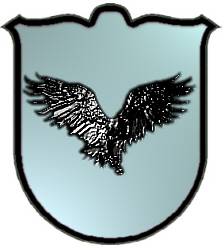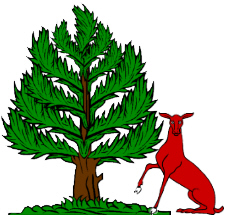
Coat of Arms: Silver with a black eagle.
Crest: Description not available
Motto: Reviresco.
Motto Translated: I flourish again.
English Origins:
Coat of Arms: Silver with a black eagle.
Crest: A seated deer by the side of a pine tree.
Motto: Reviresco.
Motto Translated: I flourish again.
Some of the first settlers of this name or some of its variants were: Alan, David, George, Henry, Hugh, James, John, Mary, Robert, Samuel, Thomas, William Maxwell all arrived in Philadelphia between 1840 and 1860. In Newfoundland, William was a soldier of St. John's in 1821.

"Mack is a Scottish patronymic name from an Old Norse given name Makkr , which was a form of Magnus. Occasionally, in the US, the name Mack is an shortened form of any of the many Scottish names that began with the patronymic designator Mc, or Mac. Maccus is a variation.
The use of surnames seems to have commenced in France about the year 1000, and surnames were introduced into Scotland through the Normans a little over one hundred years later, thought he custom of using them was hardly common. The first official reference to the practice is from a general council held at Forfar in 1061, during the reign of Malcolm Ceannmor (1057-1093). Malcolm directed his chief subjects to create surnames from the names of their territorial possessions. Thus, the first people in Scotland to acquire fixed surnames were the nobles and great landowners, who called themselves, or were called by others, after the lands they possessed. The form of the names was Norman, - - - de - - -, for instance, Robert de Brus (Brus in Normandy), John de Balliol
The Maxwell clan motto is "Reviresco" which means "I will grow strong again". "
Contributed by Sharon Lindstrom
THE MAXWELLS
Extract from The Great Historic Families of Scotland, By James Taylor, M.A., D.D., F.S.A and published in 1887
THE
founder of the Maxwell family is said to have been a certain Maccus,
the
son of Undwin, a Saxon noble, who at the Norman Conquest took refuge in
Scotland.
He was a distinguished person in the reigns of Alexander I. and David
I., and received from the latter a grant of fertile lands on the banks
of the Tweed, near Kelso, which from him received the appellation of
Maccuswell, and, abbreviated into Maxwell, became the designation of
his descendants. He witnessed an inquest which David ordered to be made
about the year 1116. A Herbert de Maccuswel, who died in 1143, made a
grant of the Church of Maccuswel to the monastery of Kelso. A Sir John
de Maccuswel was Sheriff of Roxburgh and Teviotdale in 1207, and held
the office of Great Chamberlain from 1231 to 1233. His son, Aymer de
Maxwell, was Sheriff of Dumfriesshire and Chamberlain of Scotland. He
obtained also the office of Justiciary of Galloway. By his marriage
with the daughter and heiress of Roland de Mearns, he obtained the land
and baronies of Mearns and Nether-Pollok in Renfrewshire, and Dryps and
Calderwood in Lanarkshire. His second son, John, was the founder of the
Nether
- Pollok branch of the family, on whom a baronetcy was conferred in
1682.
Throughout the perilous and trying times of the War of Independence,
the
Maxwells, like many other Scottish nobles of the Saxon and Anglo-Norman
race,
repeatedly changed sides. In the
![The Red Thread Coat of Arms sample coat of arms [full]](http://the-red-thread.net/genealogy/bailey-stationary.jpeg)
Sample Coat of Arms - Full
http://genforum.genealogy.com/maxwell
LOST TRIBES OF ISRAEL IDENTITY
English:
Spelling variations include: Maxwell,
Maxweel, Makeswell, Makiswell, Maxuel, Maxwaile, Maxwale and many more.
First found in Yorkshire where they were seated from early times and their first records appeared on the early census rolls taken by the early Kings of Britain to determine the rate of taxation of their subjects.
